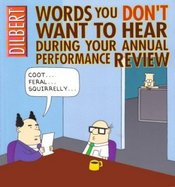One of the times of the year some managers dread is annual performance review time. Unfortunately, we often do not provide frequent enough informal reviews to our employees and have to pop everything on them one time a year. Do you keep track of the accomplishments of your employees throughout the year? Do you correct “on the spot”, or save it for a once-a-year bitchfest? Do you keep track of your own accomplishments throughout the year?
More Frequent Performance Reviews
One way you can mitigate the Annual Performance Review Blues is to provide more frequent performance reviews. When I managed a PC Support team at a large corporation, I would often provide quarterly quick review sessions with my employees. This provided them an opportunity to see how I, and their upper management, views their performance, accomplishments, and problems. Many times these were revealing and difficult sessions, but when annual performance review time came, none of what I said was a surprise.
These frequent performance reviews can be written or just verbal, but I always kept written notes of them to ease the pain of writing a dozen reviews at the HR-mandated performance review period.
If the Performance Review is a Surprise, You’re Not Doing Your Job
If you walk into a performance review meeting with your employee and the employee is shocked by what you say – you’re not doing your job as a manager. The role of the manager is to ensure tasks get accomplished, while motivating and correcting employees to achieve those tasks. Employees should have a rough idea of how they are performing throughout the year so when the annual review time comes around, they are not shocked from the outcome.
 When I was a rookie manager, I had an employee, Todd, who was not performing very well. He was consistently doing less work than his counterparts, took a long time to accomplish short tasks, and had a tendency to not show up to work on time. I had many talks with Todd throughout the year and his performance was not improving. When it came time to perform his annual review, his self-review indicating he was the model employee. “Excellents” and “Exceeds Expectations” abounding on his self-evaluation and I wondered why he didn’t see his performance problems as clearly as I did.
When I was a rookie manager, I had an employee, Todd, who was not performing very well. He was consistently doing less work than his counterparts, took a long time to accomplish short tasks, and had a tendency to not show up to work on time. I had many talks with Todd throughout the year and his performance was not improving. When it came time to perform his annual review, his self-review indicating he was the model employee. “Excellents” and “Exceeds Expectations” abounding on his self-evaluation and I wondered why he didn’t see his performance problems as clearly as I did.
We sat down to do his review and he disagreed with me on almost every point! I had performance data to back up my review – he performed a third less work than his counterparts, the time he took to close certain issues was twice his peers, and he didn’t rate well on his customer surveys. Though throughout the review, he debated me on each point and believed he had performed an excellent job!
At the time, I thought Todd had no clue and this was just another example of how poorly he performed. What I came to realize was that I did not do enough throughout the year as a manager to correct issues, to provide the training Todd needed, and to provide enough timely feedback to help Todd improve. I failed as a manager and need to correct my own problems in order to improve his performance.
Fortunately, over the next year, Todd was able to make significant improvements in his performance and become a good employee. Had I not realized my own shortcomings in dealing with Todd, he may have just been swept aside and we would have lost the years of knowledge and experience he brought to the team.
Dealing with Performance Based Raises
Corporations often provide a budgeted amount all salary increases must fit into. For example, the target budget percentage for the team is 4% – you can give 4% across the board, of give some individuals 5%, some 3%, some nothing, as long as the average is less than or equal to 4%. Salary increases is an area many managers make significant mistakes in, illustrated by: the penny-pinching manager, the everyone-is-equal manager, or the old-hand-gets-the-raise manager.
The Penny Pinching Manager
The first type of manager makes the mistake of making a sacrifice of the entire team to beat budget. If this manager is given a 4% budget for increases, they consistently come in well under, at say, 2%, being a miser with the money and not handing out raises many on his team deserve. This miser will often have good performers on the team who leave for managers who are more willing to give a raise and end up with a team of poor performers who are pissed at annual raise time.
Everyone-is-Equal Manager
The second type of manager makes the mistake of not wanting to offend anybody, so he gives an across-the-board raise to meet budget. This manager, if given a 3% budget for raises, gives everyone 3% regardless of performance. This manager could also shirk responsibility by giving very small differences in pay to different performers, for example, excellent performers get 3.2%, while poor performers get 2.8%. This type of manager attracts non-confrontational employees who are happy receiving equal pay with their peers.
Old-Hand-Gets-the-Raise Manager
The last type of manager gives pay increases based on the length of time you have been on the team. The longer you have been with him, the better the raises get. Alternatively, this manager gives higher percentage increases to newer employees (5% of $21,000 a year is less than 5% of $75,000 a year) and provides smaller increases the longer you are on the team. The former encourages new blood to leave, while the latter encourages employees with experience to leave for greener pastures.
The Manager with Guts
The right way to handle salary increases is to provide pay increases commiserate with the employee’s performance. If the employee performs excellently, give her an exceptional raise. If she performs poorly, give her no or little raise. Being this type of manager takes guts and is often too rare in corporate America.
By being an effective manager and handling performance review time correctly, you can properly motivate and get the most our of your employees.
Now we’re moving on to what to say on a performance review. Good luck!
Update: We recently launched a new site about performance reviews, http://ihateperformancereviews.com/, which has sample phrases, performance reviews, and excellent articles about performance management.
 Performance review time can be a struggle for many managers to adequately review and rate their employees. In this ebook, we’ve written over 1,000 template performance review phrases you can use to review your employees. This is different than other performance review phrase books, we provide entire sentences to describe an employee which you can simply cut and paste into the review documents. We’re selling the ebook for $25 for an instant download.
Performance review time can be a struggle for many managers to adequately review and rate their employees. In this ebook, we’ve written over 1,000 template performance review phrases you can use to review your employees. This is different than other performance review phrase books, we provide entire sentences to describe an employee which you can simply cut and paste into the review documents. We’re selling the ebook for $25 for an instant download.
View our Effective Performance Review Product Page – or –

Thank you,. Very helpful
[…] on my blog, Jerm.com, my most popular posts are about performance reviews. It’s a sad state of business that we’ve come to the point that instead of helpful, […]
great article, thanks !!